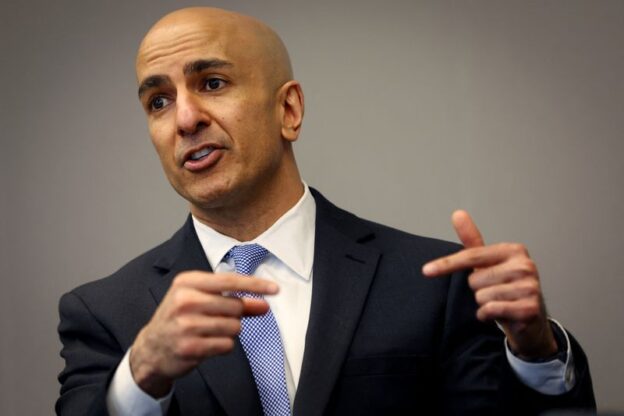© Reuters. FILE PHOTO: Neel Kashkari, President and CEO of the Federal Reserve Bank of Minneapolis, speaks during an interview with Reuters in New York City, New York, U.S., May 22, 2023. REUTERS/Mike Segar/File Photo
(Reuters) – Minneapolis Federal Reserve Bank President Neel Kashkari on Wednesday signaled that stronger economic data since the start of the year will likely make it appropriate for the Fed to cut rates only twice, or possibly just once, this year.
“I was at two in December,” Kashkari said in an interview on WSJ Live, referring to the number of quarter-point interest-rate cuts he had penciled in when Fed policymakers last made their quarterly economic forecasts. Fresh projections are due in two weeks, when the Fed next meets to set policy.
“It’s hard to see, with the data that’s come in, that I’d be saying more cuts than I had in December,” Kashkari said. “It seems like at a base case I’d be where I was in December, or potentially one fewer, but I haven’t decided.”
The median forecast of his colleagues in December was three rate cuts this year, which would take the Fed policy rate to a range of 4.5%-4.75%, from its current 5.25%-5.5% range.
Kashkari said the “base case scenario” is that the Fed will not raise rates any further, a view shared by all Fed policymakers, based on their forecasts published in December and remarks since.
If the economy stays resilient and inflation proves to be more entrenched than expected, Kashkari said, “the first thing we do is keep rates where they are for an extended period of time.”
With the economy and the labor market strong and inflation coming down, he said: “I would want to see the argument for, why do we think we’re actually tamping down the economy if the economy is ongoing in such a healthy way?”
The Fed does want to avoid a downturn, he said, and to stick a “soft landing” where inflation falls but the job market does not collapse, as it historically has done when the Fed has waged a battle with too-high inflation.
But now, he said, “if the economy is doing very well, maybe the economy can sustain this rate environment when we didn’t realize that was possible,” Kashkari said.

Comments are closed